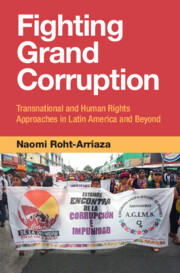Refine search
Actions for selected content:
3 results
1 - The Grand Corruption Problem
- from Part I - Setting the Stage: International and Transnational Law and Policies
-
- Book:
- Fighting Grand Corruption
- Published online:
- 03 April 2025
- Print publication:
- 10 April 2025, pp 3-18
-
- Chapter
- Export citation

Fighting Grand Corruption
- Transnational and Human Rights Approaches in Latin America and Beyond
-
- Published online:
- 03 April 2025
- Print publication:
- 10 April 2025
3 - Immunity from Foreign Jurisdiction as a Gateway to Transnational Corruption and Money Laundering
-
- Book:
- Between Immunity and Impunity
- Published online:
- 14 December 2023
- Print publication:
- 21 December 2023, pp 142-195
-
- Chapter
- Export citation
